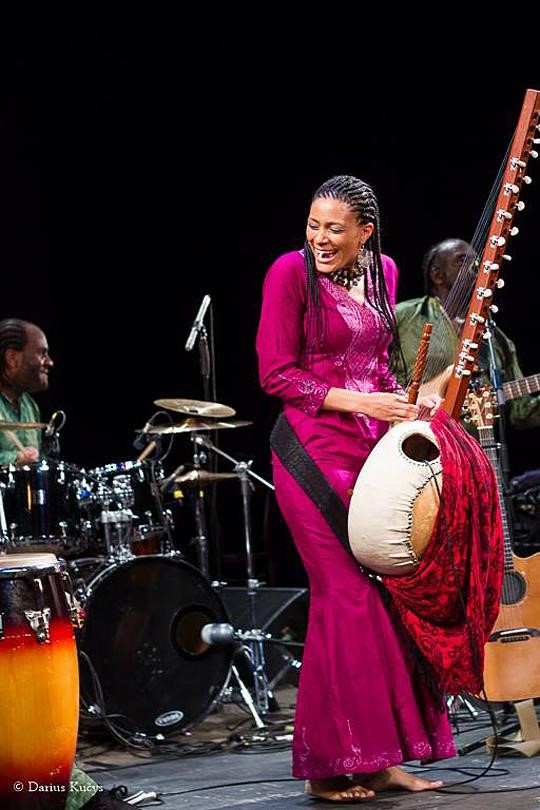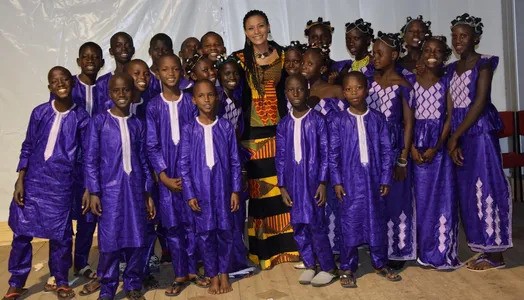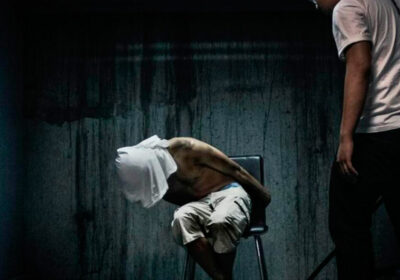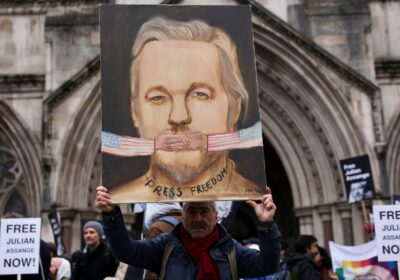SONA JOBARTEH: THE KORA THAT HEALS THE AFRICAN BLUES

Some seemingly unpleasant moments of childhood, once adults, can be revisited and reworked – this is probably what happened to little Sona: on boring family evenings, her wise grandmother asks her to sit with the elders and listen. The music starts, the women sing, the children chirp all around, and she wants to be with them. But very soon she realises the importance of her ancestors and, today, she thinks of her grandmother with tenderness and gratitude. Today, almost 40, Sona leads a generation of musicians – and has taken the place of her father, her grandfather, and who knows how many previous generations of kora players[1].
She is the granddaughter of the great griot master Amadu Bansang Jobarteh[2], considered one of the greatest ever[3], who migrated from Mali to Gambia. But she is also a cousin of an even more popular figure[4], Toumani Diabate[5] , the man who made the kora world-famous and a Grammy winner in the United States[6]. From the age of three, she chose this instrument with the help of her brother, Tunde Jegede[7]. She chose it because she wanted to become a griot, a minstrel who tours the country telling the story of her people.
The kora is a large gourd cut in half, cowhide, a hardwood neck and 21 strings halfway between a harp and a lute. The musician plucks the strings with the thumb and forefinger of both hands, producing clear, melodious music[8]. It is one of the main instruments of the Mandinka[9] of West Africa, and belongs exclusively to the griot clans, the families in which the role of minstrel is inherited from generation to generation: only those born into one of these clans have the right to play the instrument professionally. Sona became the first internationally successful female griot – representing a cultural history spanning more than seven centuries[10]. The world has changed: the kora, the preserve of men for hundreds of years, is now also played by women thanks to her.
At the age of 28, Jobarteh, with her father by her side to support her, felt ready to play the kora in public, on a small stage at the Alliance Français in Banjul[11] , the capital of The Gambia[12] – a tiny, snake-shaped country undergoing profound mutation, which is re-emerging on the global stage after 22 years of authoritarian and criminal rule by former president Yahya Jammeh[13]. His successor, Adama Barrow[14], was elected in December 2016, paving the way for social, economic and cultural development[15]. The Gambia has a culture closely linked to the country that surrounds it on all sides – Senegal. A culture of which the griots are one of the immortal symbols[16].
Hmmmm, suba saya. In the darkness of death. The orphans cry out. That sickness is the source of death. Can’t you see that I have suffered in pain? I have no more hope in this world. Because death has broken my heart. But one must resign oneself to fate. Mother, please help me to accept this face. I am talking to you, my love. Listen to what I am trying to say. My words have turned to air. No one can change destiny. You know the pains of love. You left me here in darkness. With a broken heart and a longing for you. Only God can repay you. For what you have done for me in this life. I promise you one thing. I will never forget you. My mother told me that life is difficult. Some people laugh while others cry every day. When you left this world you also took a part of me with you. The words you said to me. To this day I still think of those you said to me. I promise you. Till I die I will never forget you. No one can change destiny You know the pains of love. You left me here in darkness. With a broken heart and a longing for you. Only God can repay you For what you have done for me in this life. I promise you one thing. I will never forget you[17]
As Europe was at the end of the Middle Ages, travelling griot musicians brought news and ceremonies throughout West Africa to the empire of Mali[18], home of the thousand-year-old mandinka culture – a culture with a strong emphasis on music and storytelling. Young people learn their history of their homeland through songs and stories handed down from generation to generation by the singing of the griots and the sound of the kora[19]. The griots are therefore musicians, storytellers, poets, oral historians, who for centuries (the oldest known lived in the 13th century) served at court, even taking on roles as advisors to royal families, but who at the same time travelled the immense distances of the ancient Malian empire on foot, to bring the story of the mandinka to even the most remote village on the edge of the desert[20].
The famous pop singer-songwriter Youssou N’Dour[21] also belongs to a griot family, as does the Malian dynasty of the Diabaté[22], cousins of Sona and griots for centuries[23]. Besides being intellectuals and historians, they also play the role of mediators in village disputes, acting as engines of social balance and cohesion. The introduction of writing and the socio-economic transformations that occurred with colonisation have radically changed Africa and have consequently also changed the function of the griot[24], but according to Sona ‘it is crucial that the original role of the griot be revived. Criticism must return to tradition. We have a whole generation of young people who are very talented and who, unfortunately, have to turn to hip-hop and R&B to express themselves. This is really sad’[25].
It was not easy for her as the first female griot: as a girl she was ashamed of being a woman, she did not want to be seen as a ‘weirdo’, but to be accepted as equal to men. Her parents had emigrated from The Gambia to London[26], and Sona, who was born there, preferred to play football instead of studying music as a child[27]. Back in Gambia, she realised that her passion for sport would ruin her existence: being part of a women’s team was still unacceptable – the same with music. But she is stubborn, and decides to follow her father’s tradition, breaking the rules.
Forgive me, mothers, but money cannot buy love. True, forgive me, fathers, no wealth can buy love. It does not touch you without reason. By God, one who possesses everything Can still be alone and worry about life. While a poor person with nothing Can find the happiness that love brings. I didn’t know love was so beautiful. You left me wondering in sadness. I don’t want gold, I don’t want money. Just to know that I’m the one you love. Love, love is like an alcoholic beverage and I am addicted to it. Love, love is a disease for which there is no cure. Love, love is like an alcoholic beverage and I am addicted to it. Love, love is a disease for which there is no cure ever. Oh my love, take my hand. Don’t leave me, please stay with me. Can’t you see that I am worried and in pain? I am suffering, suffering, please stay with me. Talk to me, talk to me and reassure me. Don’t listen to what people say about me. Smile at me, smile at me and take my worries away. You know, I’m just in love. You have brightened up my life. Now, my heart is full of joy. The world should realise that love is more powerful than anything else. And once you taste it, it will change your life forever. Love is like an alcoholic beverage and I am addicted to it. Love is a disease for which there is no cure. I am sick, I am sick because of love, I am sick, I am sick because of love![28]
Once she has chosen his path, she follows it doggedly: she attends the Royal College of Music[29], where she studies cello, piano and harpsichord[30], then studies classical music at the Purcell School for Young Musicians[31], and finishes at Soas University in London[32]. Many teachers at Soas, in fact, belong to his family, and they discovered his great talent[33]. So, she chose to follow the teachings of her father, Sanjally Jobarteh[34], who now lives in Norway[35], and her aunt and uncle. She started playing in her older brother Tunde Jegede[36]‘s band ‘ACM Ensemble’[37] : mainstream music, R&B, reggae, hip-hop. She toured the world for years, having the opportunity to work alongside internationally renowned artists such as Oumou Sangaré[38] , Toumani Diabaté[39] and the BBC Symphony Orchestra[40].
Deep down she feels that it is a genre that does not belong to her: she wants to be a griot, not just any pop star. She loves all instruments but, as she explains, not all of them ‘speak’ to her in the same way. At 17, she chose the kora for good, convinced of the importance of Mande music[41] as a means of passing on the traditions of her ancestors. She invented a new instrument called the Nkoni, a cross between the Kora and Donso Ngoni, a new medium to be used in many compositions to capture an absolutely unique sound[42].
Naturally, in Africa she is considered an icon[43]. An anti-conformist from birth, she doesn’t give a damn about traditional gender roles – and at the core of her success is a unique dedication to humanitarian activism, to the re-proposition of a new social development and educational reform that is non-Western, not a child of colonialism, but purely African[44]. This is why, throughout West Africa, she is considered a revolutionary, and her statements carry more weight than those of many powerful politicians. She feels strongly that the values of young people fortunate enough to attend school will shape a system in which African culture, history, traditions and their intrinsic values are non-existent or relegated to the margins of school activities. She claims that progress on the African continent depends on its own children first learning about their own country.
But education in The Gambia is not paid for by the state. Students’ families have to pay school fees to ensure their children’s education. As the schooling progresses, due to the expenses, the classes become empty, especially of girls. Students are required to use English exclusively, under pain of reprimands or punishment. Mandinka, the West African Mande language is not part of the school curriculum[45].

Sona, in traditional dress, with her kora[46]
Sona is convinced: ‘Culture is also very important to open up avenues for trade’ and, slowly, to decrease the high unemployment that, especially among young people, leads to both internal and foreign migration. The griot wants to promote entrepreneurship and create quality jobs, to strengthen and stabilise The Gambia. As music, culture and the arts easily cross borders[47]. Her efforts, in 2015, are repaid with the founding of the Gambia Academy[48], dedicated to her grandfather: the first school in The Gambia to offer a high-level traditional academic curriculum, bringing the culture, traditions and history of its people to the centre of students’ education.
In 2017, she bought 40 acres of land in Kartong[49] to build not only the school, but also a cultural centre and classrooms for 140 students[50]. Sona’s work attracted the attention of the President of Germany, who came to visit the academy to gain a deeper understanding of what the school is all about. The African Festival in Germany is now one of its main sponsors[51]. One thing that has taught Sona Jobarteh is that participation in high-profile events around the world, including United Nations and UNICEF summits, is a decisive contribution to the emancipation dream of a modern Gambia that is at the same time bound to its traditions[52].
The extent of her international success is evidenced by over 10 million views on YouTube and other digital platforms[53]. Her international reputation took off after composing the soundtrack for ‘Motherland’, a beautiful docu-film on Africa released in 2010[54], followed by the soundtracks for the films ‘Roots’ and ‘Mandela’[55]. Her second album in 2011, Fasiya[56], established her as one of the most original and interesting African musicians of the new generation. The third album, Gambia, dedicated to her beloved homeland, continues the evolution of her style: a mixture of traditional music, jazz, blues and afropop[57].
Her music, unlike that of her contemporaries, instead of forcing African rhythms and melodies into Western pop structures, she expands traditional African structures and expands them, creating a unique and typically African jazz[58]. She reworks traditional songs and transforms them into new compositions, inspired in style by the Malian singer-songwriter Habib Koitè[59].
Built in peace and stability, hosted by development and progress, humanity and happiness is on everyone’s face, our extraordinary country, The Gambia. Wherever you are, never forget your Gambia homeland. For if you forget your roots, you will turn your back on who you are. We are proud… We are proud of our country. We are proud… Let’s unite and unite. We are proud This is what will lead to progress. People of The Gambia; this is the beautiful land. People of The Gambia; this is the land of peace. People of The Gambia; this is the land of our people. People of The Gambia; there is nothing that can compare to this land. People honour this country because it is blessed. We must not abandon our beautiful country. Sons and daughters of this land, let us all come together. I will truly always be proud to be a Gambian. Wherever I travel, I will tell of the wonders of this country. There is no other place that can compare to The Gambia[60]

Sona with students from the Gambia Academy, which she founded[61]
Sona says that ‘Learning to play the kora is not just a matter of technique. You cannot separate the technique from the symbolism of the oral tradition, of the story told and, therefore, of the meanings of the piece you are trying out’. She sings with a voice full of blues streaks, in her native language – her melodies taste of sand and desert, of wind and sun, of pride and distant memories and represent a benchmark for world music[62]. When you listen to it for the first time, squinting your eyes, you feel curiously at home. In a place that needs people like her, because in the general and irreversible degeneration of Western society and culture, Africa has remained our great hope for a humanity that still has the ability to change without denying itself. And she does so with a smile of a talented, aware, intelligent and ambitious young woman.
FRA025
[1] https://www.kulturarena.de/programm/sona-jobarteh.html
[2] https://worldmusiccentral.org/2018/06/13/artist-profiles-amadu-bansang-jobarteh/
[3] https://www.friulionline.com/cultura-spettacoli/sona-jobarteh-dal-gambia-a-gorizia-canta-e-suona-la-kora/
[4] https://www.cultura.trentino.it/Appuntamenti/Sona-Jobarteh
[5] https://musique.rfi.fr/artiste/musiques-monde/toumani-diabate
[6] https://www.theguardian.com/music/2021/apr/07/ballake-sissoko-picking-up-the-pieces-after-us-customs-broke-his-kora
[7] https://www.200worldalbums.com/post/the-gambia-uk-fasiya-sona-jobarteh
[8] https://www.info.gov.hk/gia/general/201711/02/P2017110200390.htm
[9] https://www.history.com/news/who-are-the-mandinka
[10] http://dialna.fr/musique-sona-jobarteh-gambia/
[12] https://www.theguardian.com/music/2022/jul/27/kora-player-sona-jobarteh-i-didnt-want-to-be-told-you-are-good-for-a-woman
[13] https://www.agenzianova.com/news/gambia-governo-pronto-a-perseguire-lex-presidente-jammeh-per-i-suoi-crimini/
[14] https://www.africarivista.it/gambia-rieletto-adama-barrow-uomo-di-luci-e-ombre/194972/
[15] https://ec.europa.eu/trustfundforafrica/all-news-and-stories/reawakening-gambian-culture-through-trade-and-vice-versa_en
[16] https://www.200worldalbums.com/post/the-gambia-uk-fasiya-sona-jobarteh
[17] hmmmm, sooba saya
f+gantɔw lu kasikan
ko bana ye saya fa ye!
alu ma yee ne dun sɛɛ la ne dun tɔrɔ la?
dunuya kɔnɔ diya ban na
bali saya ye n’dusu kasi
fɔ jɔn ye sabali
aaah n’na ye la, i ka n’sɔɔn limanya
ɲee le ma, kanu
i tolo malɔ ɲe k+ma la i fɛ
n’ka k+ma kan kɛla fɔnɲɔn ye
mi ye dankan ye i seko tɛ a ra
i le ma ye ko diyɛya ye gɛlɛma
i ta lén min ka ne to dibi oh
dusukasi ni ɲanafin ooho
i ye min kɛ ɲe dunuya tigɛ rɔ, allah dɔrɔn bi i la sara la
n’bena layiri duguni ta ye, fɔ ka n’sa, n’tena se ka ɲina i kɔ
n’naa le ka fɔ, jamana sigi dun gɛlɛma
dɔ lu yɛlɛ la
dɔ lu ye kasi la lòn lòn
i ta la dugmina ma su, i ta la ne n’fandɔ fana ye
i ye k+ma kan mi fɔ, halisa m’be miri o lòn la sini
ne kɔni m’be kali i ye bi, fɔ ka n’sa, n’te ɲinɛ i kɔ
mi ye dankan ye i seko tɛ a ra
i le ma ye ko diyɛya ye gɛlɛma
i ta lén min ka ne to dibi oh
dusukasi ni ɲanafin ooho
i ye min kɛ ɲe dunuya tigɛ rɔ, allah dɔrɔn bi i la sara la
n’bena layiri duguni ta ye, fɔ ka n’sa, n’tena se ka ɲina i kɔ
ooo saya, m’maa saya
[18] https://thepracticeofpractice.com/2014/03/05/sona-jobarteh-multi-instrumental-musician/
[19] https://essnature.com/it/cinque-cose-da-sapere-sul-mandinka/
[20] https://www.info.gov.hk/gia/general/201711/02/P2017110200390.htm
[21] https://www.rockol.it/artista/youssou-n-dour
[22] https://www.cairn.info/revue-africultures-2004-4-page-66.htm
[23] https://www.200worldalbums.com/post/the-gambia-uk-fasiya-sona-jobarteh
[24] https://www.rsi.ch/rete-due/programmi/cultura/laser/Cosa-significa-essere-griot-oggi-301638.html?f=podcast-shows
[25] https://www.theguardian.com/music/2022/jul/27/kora-player-sona-jobarteh-i-didnt-want-to-be-told-you-are-good-for-a-woman
[26] https://beyondthesinglestory.wordpress.com/2018/11/19/sona-jobarteh/
[27] https://www.theguardian.com/music/2022/jul/27/kora-player-sona-jobarteh-i-didnt-want-to-be-told-you-are-good-for-a-woman
[28] Aw y’afama nalu, wari tè kanu sanna
Wuya tè aw y’afama n’falu, nafolo tè kanu sanna
A se mòosi ma guansan
Walay fen bèe bè dòfè,
Nk’o siini miirijan de la,
Ali fosi tè mòo min fè ,
Jarabi di na o dusu sumaya
Ne tun ma lòn ko diyanye duman tan
I k’an to kini kini le la
N’tè sanu kò, n’tè wari dun kò
Ka lòn ten ko ne kelen dòrònle duman i ye.
Jarabi, jarabi ye dòlò le di dunya, ne tè se k’a to yen
Jarabi, jarabi ye bana le di dunya, fura tè bana min na
Jarabi, jarabi ye dòlò le di dunya, ne tè se k’a to yen
Jarabi, jarabi ye bana le di dunya, fura tè bana min na abada.
A n’diya, n’bolo mina sa
Kana taa, to n’dafè sa
io ma n’ye hami ni miiri la wa?
Woyiyo, woyiyo n’b’i dari
Kuma n’fè, kuma n’fè, ka miiri bò n’na
Kana n’mina mòo kan ma
Yèlè n’fè, yèlè n’fè, ka hami bò n’na
I ma lòn i diyanye bana le ye n’na.
I kèlen yeelen di ne ma
Sisan ne kòni sèwara
Fo k’a ye ko diyanye min ye
A fanka ka bon ni fèn bèe ye
N’i y’a nènè dòròn sinya kelen
A b’i la dinya latè yèlèma.
Jarabi, jarabi ye dòlò le di dunya, ne tè se k’a to yen
Jarabi, jarabi ye banna le di dunya, fura tè banna min na
Jarabi, jarabi ye dòlò le di dunya, ne tè se k’a to yen
Jarabi, jarabi ye banna le di dunya, fura tè banna min na abada.
Woyiyo woyiyo jarabi, woyiyo woyiyo jarabi
[30] https://www.centrosantachiara.it/shows/spettacoli/sona-jobarteh-itinerarifolk
[31] https://www.purcell-school.org/
[33] https://theguardian.com/music/2022/jul/27/kora-player-sona-jobarteh-i-didnt-want-to-be-told-you-are-good-for-a-woman
[34] https://www.afrisson.com/sanjally-jobarteh-19145/
[35] https://www.musicinafrica.net/directory/amadou-bansang-jobarteh-school-music
[36] http://www.tundejegede.org/biography/
[37] http://www.acmensemble.com/
[38] https://oumousangareofficial.com/en/home/
[39] https://www.womex.com/virtual/world_circuit/toumani_diabate
[40] https://www.laphil.com/musicdb/artists/6610/sona-jobarteh
[41] https://afropop.org/articles/sona-jobartehs-singular-path-through-mande-tradition
[42] https://archive.org/details/podcast_afrobeatradio_sona-jobarteh-conversation_1000424637475
[43] https://controtempo.org/evento/sona-jobarteh-gambia/
[44] https://events.wfu.edu/event/an_evening_with_sona_jobarteh#.Yv8V_nZBzIU
[45] https://www.studocu.com/it/document/universita-degli-studi-di-palermo/lingua-e-traduzione-francese/sistema-scolastico-del-gambia/28019936
[46] https://www.200worldalbums.com/post/the-gambia-uk-fasiya-sona-jobarteh
[47] https://ec.europa.eu/trustfundforafrica/all-news-and-stories/reawakening-gambian-culture-through-trade-and-vice-versa_en
[48] https://thegambiaacademy.org/
[49] https://idmmei.org/record.php?id=3851
[50] https://www.esptakamine.com/articles/2014291-sona-jobarteh-and-the-gambia-academy
[51] https://beyondthesinglestory.wordpress.com/2018/11/19/sona-jobarteh/
[52] https://www.kingsplace.co.uk/whats-on/contemporary/sona-jobarteh-3/
[53] https://www.livearts.eu/musica/sona-jobarteh/
[54] https://eventi.comune.re.it/eventi/evento/festival-mundus-sona-jobarteh/
[55] https://www.friulionline.com/cultura-spettacoli/sona-jobarteh-dal-gambia-a-gorizia-canta-e-suona-la-kor
[56] https://sonajobarteh.com/fasiya
[57] https://eventi.comune.re.it/eventi/evento/festival-mundus-sona-jobarteh/
[58] https://www.200worldalbums.com/post/the-gambia-uk-fasiya-sona-jobarteh
[59] https://afropop.org/articles/sona-jobartehs-singular-path-through-mande-tradition
[60] Kairaya loo
Tengkungoyabeng
yiriwaningnyatotaa le yajiyaa
Hadamaya
Sewo ye nyaadaalubeng
n’nabankukendemaalem Gambia
Ibedawoda
Ikana song mummey
kanyineyfaasuwo la Gambia
Tonya
I’nyinatai’bonsungwo la
I’nyinatai’fangwo le la
Nsinganyaa
N’tenganyaata N’nabanko le la
N’singanyaa, N’singanyaa
N’singanyaa
Al nganaakafunyooma Nganyomuta
N’singanyaa
Wolemunyatotaa Ningnafasoto
Gambiankolu le
Nyinembankunyimati
Gambiankolu le
Nyingbankukaira ma
Gambiankolu le
Nyinemmoolabankooti
Gambiankolu le
Nyinenyongomangsiyaa
A nemata
Woleyasaabu
Mooluyabunyaa
Abarakata
Woleyatinna
Moolumangnyangna,
Nyingbankunyimaafaylaa
Aaaaaaaaaaaaa
Bankodingolu
Ali ngana Kafunyooma
Tonyaa
N’mangnimisa
Nyingbankudingyaala mummey
Ningtata
Duniyaakono
Nyingbankoo la diya mbafola
Gambia nyongte
Gambiankolu le
Nyinembankunyimati
Gambiankolu le
Nyingbankukaira ma
Gambiankolu le
Nyinemmoolabankooti
Gambiankolu le
Nyinenyongomangsiyaa
Gambia le ma
Gambia le ma
M’bekuuma la
Gambia le ma
Gambia le ma
M’bekuuma la
Gambia le ma…
Kairasuu,
Alaafo Gambia
Nemasuu,
Oohhhoo Gambia
Hadamayaasuu,
Alaafo Gambia
Baadingyaasuu,
Oohhhoo Gambia…
[61] https://sonajobarteh.com/the-gambia-academy
[62] https://www.friulionline.com/cultura-spettacoli/sona-jobarteh-dal-gambia-a-gorizia-canta-e-suona-la-kora/




Leave a Reply